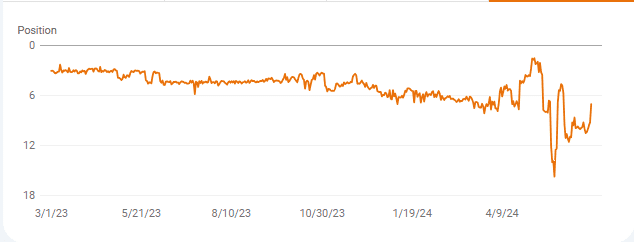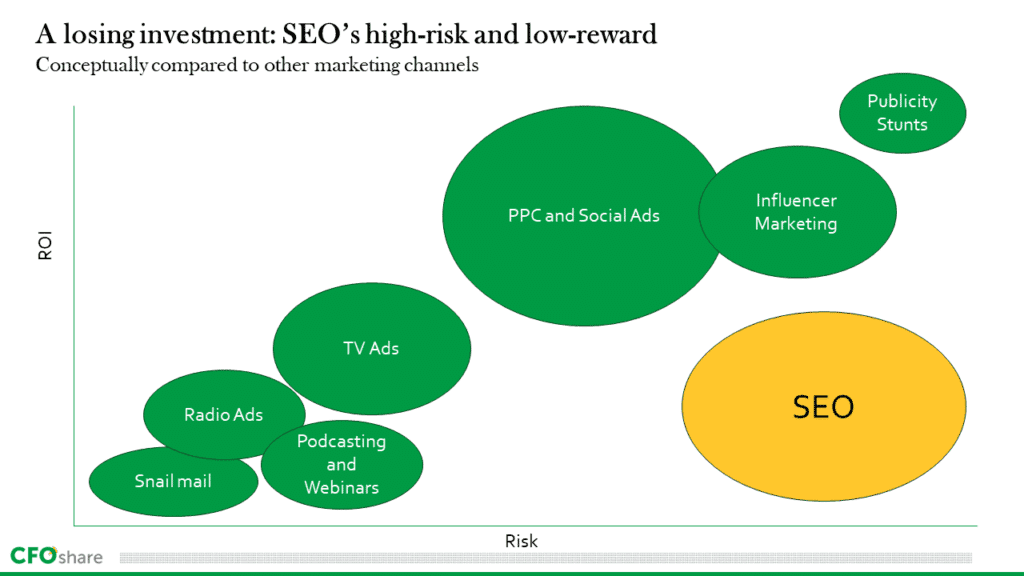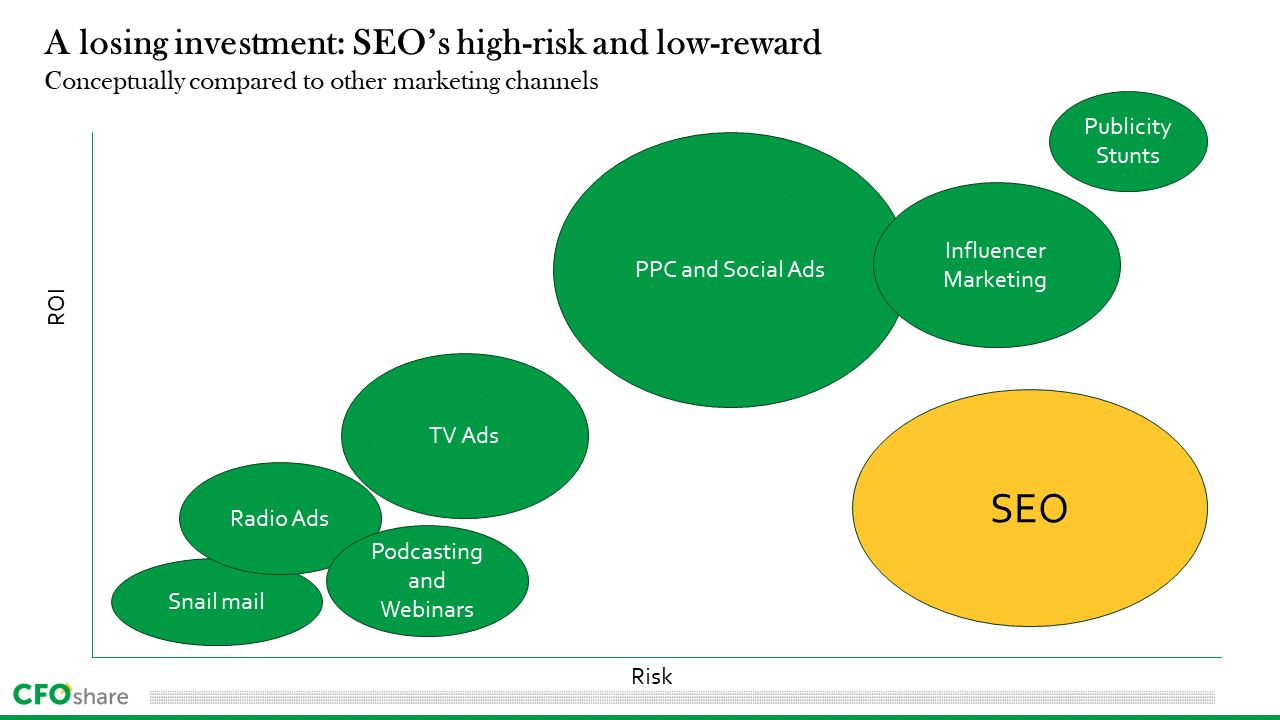
Management | Strategy
CFO Strategy: Managing the SEO Headwinds
July 18, 2024
If your SEO is struggling this year, you are not alone: the rise of AI has upended digital marketing in 2024. Plenty of articles analyze the technical SEO changes and hypothesize how AI is changing content marketing, and I read most of them when our SEO lead generation suddenly stopped working. I can summarize them all in a single sentence: nobody knows what is happening in SEO, not even Google.
My marketing team advised me to be patient—this is just an algorithm change; things will stabilize, and we should stick to our current SEO strategy. Focus and resilience are useful tactics when facing temporary distractions, but I do not see AI as a flash in the pan—it is a long-term disruption. My marketing team was using an old playbook without realizing the game had changed.
I threw out the marketing playbook and instead used financial portfolio theory to analyze risky marketing investments, hoping to distill a coherent growth strategy. This article summarizes the result: a CFO’s view on what’s happening to digital marketing and where to go from here.
AI disruption of SEO.
AI has made content production dirt-cheap (almost free.) Google is unsure how to rank this flood of AI generated content, creating an existential challenge. To cope with this, the frequency of Google Search Core Update has increased by 67%, leaving marketers scrambling to understand the shifting rules of the game.
You have probably seen the effects on your search rankings. Below is a chart of CFOshare’s ranking for one of our keywords. Before March, our position was steady. Since the Mach core update, the position has swung wildly each day, resulting in poor lead generation.

Increased volatility of page rankings following the March Google core update.
At the same time, Google is dedicating less real estate to organic search results and more towards paid ads and zero-click search.
All our clients are experiencing the same phenomena. This is today’s digital marketing headwind.
Thinking farther out, I question how long Google can hang onto the search market. People are already asking ChatGPT and Perplexity for product recommendations and service referrals. At what point do people stop Googling questions?
What does a small business do when facing uncertainty in a key marketing channel?
Applying portfolio theory to marketing
As a CFO, I think of marketing budgets as a portfolio of investments with different risks and rewards. For example, snail-mail campaigns are low-risk and low-reward. Publicity stunts like shooting a Tesla into outer space are high-risk, high-reward.
In marketing, reward is measured using LTV/CAC ratio or ROAS. By either measure SEO’s returns have declined in 2024.
Risk is trickier to measure. Risk is made up of volatility and uncertainty:
Volatility: the normal variation in expected returns.
Uncertainty: the unknowns of the future which can disrupt historical patterns.
Volatile SEO page rankings are riskier than steady, reliable rankings. By this standard, SEO has become riskier investments due to AI.
Uncertainty is more technology-dependent: old technology, such as mail, telephones, and radio ads, avoids most uncertainty. High-tech channels like SEO routinely face disruption and uncertainty.
Therefore, SEO is a high-risk, low-reward investment. You don’t need a finance degree to realize that’s a bad place to throw money. Yet I’ve encountered several marketers and business owners stubbornly sticking to their SEO strategies as though generative AI is just a passing fad.

You should analyze all your marketing channels as though they are portfolio investments. A healthy portfolio includes:
Diversification. It’s a mistake to put all your eggs in one basket. Make sure you have two or three active marketing channels for generating leads.
Appropriate risk allocation. Your business’ marketing risk should fit the overall business plan. Venture-backed startups should have a higher risk profile than a family lifestyle business.
Market-rate returns. If your marketing is not generating a fair ROI, you need to change or re-weight your strategies.
Ideas to improve your marketing portfolio
If your marketing portfolio is underperforming or overweight on risky investments, here are a few ideas to help get things back on track.
1. Diversify away from digital marketing
With an unfavorable outlook over the next 12-24 months, SEO is not a smart investment. Other digital channels like PPC and paid social may keep performing but remain vigilant for deteriorating performance as other businesses shift money out of SEO and into paid digital channels – driving up the cost for everyone.
Consider non-digital marketing channels like conferences, networking events, webinars, and referral programs, which are inherently less vulnerable to AI technology.
2. Lower growth plans OR increase marketing spend.
With rising CAC across the industry, you have a choice to increase your marketing spend or decrease your growth targets. Nobody likes lowering their growth targets, but this is the safer route when considering the general macroeconomic picture.
If you wish to keep your growth targets, you must increase marketing spending to offset higher CAC. Be cautious and keep a close eye on your golden ratio to ensure your CACs remain sustainable.
3. Shift investments towards non-marketing investments.
Marketing isn’t the only way to grow revenue and profits. With so many headwinds in revenue growth, you may find client retention, cross-selling, and upselling are better investments. Consider shifting funding toward your customer experience team or sales account managers.
New product development and innovation are the most robust drivers of long-term growth. If you can afford to slow down in the short term, you may consider allocating some of your marketing budget to research and development.
Lastly, operating efficiency is an excellent way to boost profits and lay a foundation for future scale. AI itself brings many opportunities to lower operating costs. Spend less time thinking about revenue growth and more time thinking about operating efficiency.
Be prepared for more marketing changes.
Whatever strategy you pick to adapt to the new digital marketing world, it will probably need to change again soon. The market is evolving rapidly as technology changes, so keep an agile mindset, monitor your marketing portfolio’s performance and risk, and collaborate with your team to ensure you are always thinking ahead of the competition.
Related Articles
Ready to Elevate Your Finances?
Need more specific advice? Schedule a consultation





